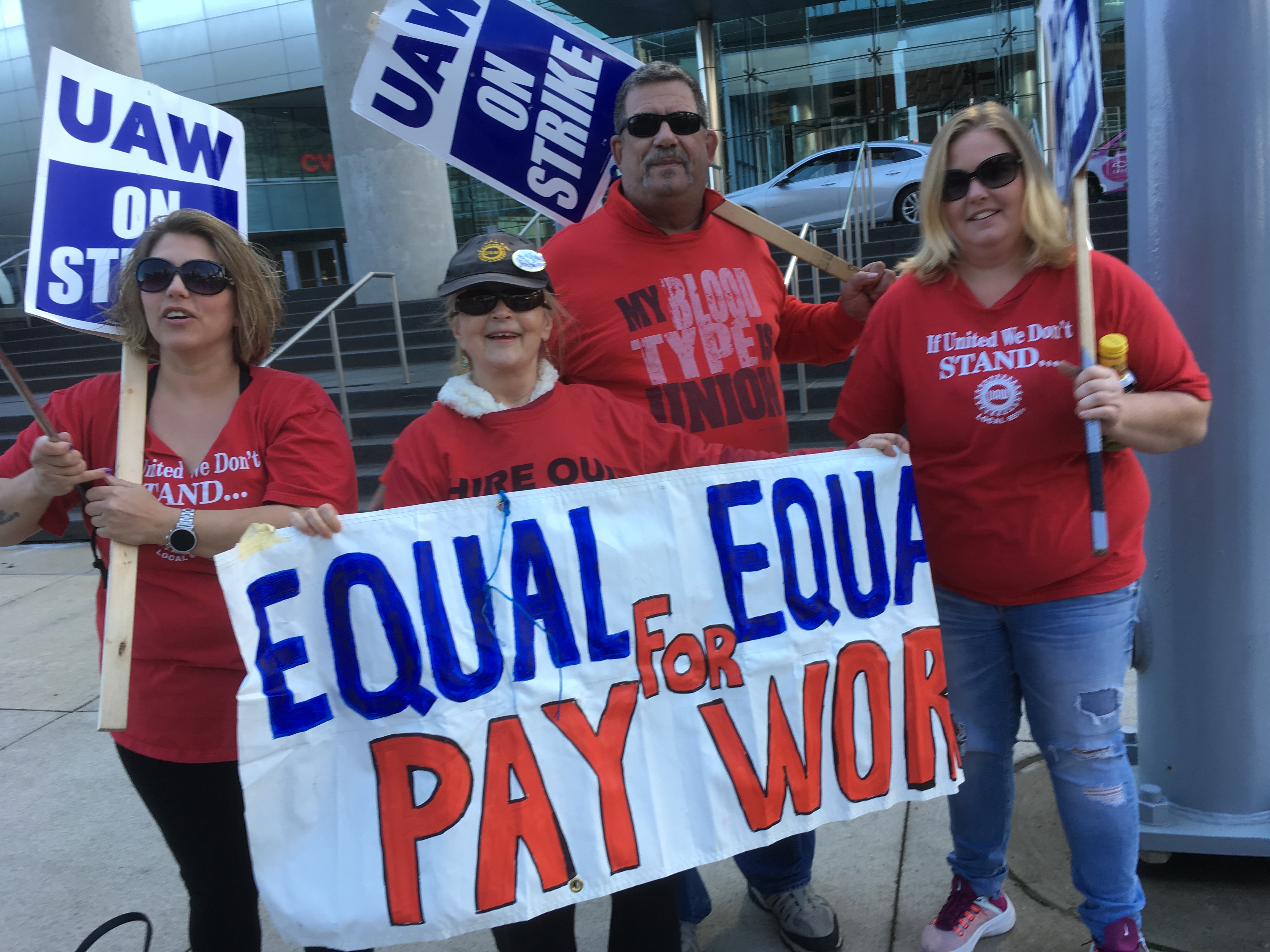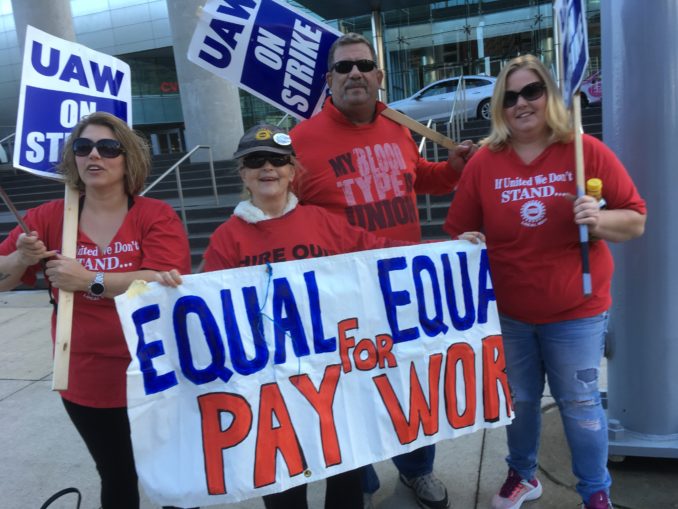

Strikers outside GM world headquarters in downtown Detroit on Oct. 9.
In 1848 in “The Communist Manifesto,” Karl Marx and Friedrich Engels made an astute observation about the emergence of labor unions. “Now and then,” the young revolutionaries wrote, “the workers are victorious, but only for a time. The real fruit of their battles lies, not in the immediate result, but in the ever expanding union of the workers.”


Strikers outside GM world headquarters in downtown Detroit on Oct. 9.
This quote is as relevant today as ever, and it’s worth keeping in mind as striking General Motors workers decide whether to accept the tentative agreement that their union leaders claim contains “major gains.”
What has happened during the past month on the picket line?
Workers who labored under the same roof but may not have had much personal contact became friends. High seniority “traditional” workers, low seniority “in progression” workers and “temporary” workers with zero seniority walked the picket line together. In some locations they were joined by the lowest-paid workers in the plant: striking janitors employed under contracts with Aramark.
The strikers won the hearts and minds of exploited people across the country, and beyond, with their emphasis on making “temporary” — i.e., precarious — workers permanent. The growth of precarious work has become a global crisis for the working class.
Isn’t this a living example of the “ever-expanding union of the workers”? Solidarity grows quantitatively during a strike. Eventually a quantitative change takes place. The “rugged individualism” fostered under capitalist society is replaced by class consciousness.
That is the greatest achievement during a strike — something that should not be lost on anyone assessing the tentative agreement that GM and the United Auto Workers negotiators hammered out over the past month.
Tiered pay a menace to solidarity
Tiered pay is when a union and management agree to allow some workers — often future workers not yet hired when a contract is signed — to be paid less than others for doing the same work. Besides being unequal and unfair, two-tier, and now multi-tier, pay scales keep a union membership divided. The results have been disastrous, as workers at GM, Ford and Fiat Chrysler Automobiles have learned since two-tier was introduced in their contracts in 2007.
FCA workers voted down a contract in 2015 that had maintained the unequal pay scales for workers hired after October 2007. They passed a revised contract that gave everyone top pay after eight years — but in the fine print were a number of hidden pay tiers, which were then brought to Ford and GM. Under the 2015-19 contract, the number of so-called “temporary employees” grew — so-called because many of them have waited years to acquire seniority.
Over the last four years, GM has made a record $35 billion in profits on the backs of the workers. This has fueled a desire to win back what workers gave up to “save the company” during the 2009 bankruptcy and earlier, during less profitable years. The agreement falls short of this goal in many areas.
The basic union principle of “equal pay for equal work” has still not been fully restored. While the agreement reduces the length of time it takes a second-tier worker to make first-tier pay, the proposed pension plans are still grossly unequal, as are other benefits.
Temporary workers will need three years of “continuous service” to be made permanent, in a process to begin in 2020. In other words, if they have been laid off for over 30 days in a row during the past three years, their service is not considered “continuous.”
What about future hires? Will they make the same pay as current workers? That is the big question, and the agreement summary posted online doesn’t answer it.
The union leaders should have insisted on the formula raised by rank-and-file activists: “Everyone tier one.” Unfortunately, inequalities remain — divisive inequalities. They threaten the precious new strike solidarity and the “expanding union of the workers.”
Doors to close at iconic Lordstown plant
In March GM idled its Lordstown, Ohio, assembly plant. This sprawling complex had employed many thousands when it opened in the 1960s. At the time it was a state-of-the-art facility that rolled cars off the lines at record speeds. Even after the steel industry abandoned the Youngstown-Warren area, Lordstown still provided good-paying union jobs to the community.
This iconic plant, which one cannot miss while traveling the Ohio Turnpike, is closing permanently, along with transmission plants in Michigan and Maryland. This means workers have to relocate to far-off locations to keep their jobs.
Some dislocated former Lordstown workers demonstrated outside the meeting of GM local union leaders in downtown Detroit on Oct. 17, vowing to vote no to any agreement that doesn’t keep their home plant open.
There are additional past concessions this agreement fails to reverse. On the other hand, GM’s attempts to force workers to pay thousands more in health care premiums were turned back. And there is some progress toward pay equity — just not enough.
How will workers vote? It’s hard to know. Some may feel that, after the fight they put up, they deserve better. Others may think this is the best contract they’re going to get out of GM, which has played hardball from day one.
In the meantime, workers are still on strike — they still welcome our support.
Martha Grevatt, Trustee of UAW Local 869, is retired from FCA after 31 years. She was a founding board member of Pride at Work and served as vice president of its Michigan chapter.
Hamas issued the following statement on April 24, 2025, published on Resistance News Network. The…
By D. Musa Springer This statement is from Hood Communist editor and organizer D. Musa…
Portland, Oregon On April 12 — following protests in Seattle and elsewhere in support of…
This statement was recently issued by over 30 groups. On Friday, March 28, Dr. Helyeh…
When Donald Trump announced massive tariffs on foreign imports April 2, Wall Street investors saw…
The century-long struggle to abolish the death penalty in the U.S. has been making significant…